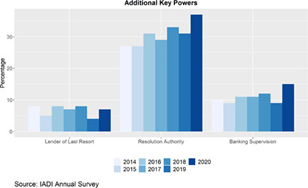Enhancing the Financial Capacity of DIV – An Urgent Requirement
Regarding the investment activities of DIV, Article 30 of the Law on Deposit Insurance stipulates:
"The operational capital of the deposit insurer includes: Charter capital granted by the State budget; revenue from deposit insurance premiums; revenue from investing temporarily idle funds of the deposit insurer; and other revenue as prescribed by law."
Article 31 of the Law on Deposit Insurance stipulates:
"The deposit insurer is permitted to use temporarily idle funds to purchase government bonds, SBV treasury bills, and deposit funds at the SBV."
However, the Law on Deposit Insurance does not yet stipulate that DIV is allowed to sell government bonds and SBV treasury bills when necessary. Meanwhile, in the event that deposit insurance payment obligations arise, DIV needs to be allowed to sell the government bonds and SBV treasury bills it holds to fulfill its obligations proactively.
According to DIV information, more than 99% of its temporarily idle funds are invested in government bonds on the primary and secondary markets and deposited at the SBV. DIV has not yet purchased SBV treasury bills on the secondary market due to their short maturities, low interest rates, and the limited number of available sellers.
Additionally, investing in government bonds in recent years has encountered difficulties as government bond interest rates have decreased.
"DIV has only one investment portfolio under the condition that the State Treasury only holds auctions once a week, making it difficult for DIV both in terms of investment opportunities and execution—especially when a large amount of temporarily idle funds is available at times when no auction is held," according to information from DIV.
According to the provisions of the 2024 Law on Credit Institutions, DIV has been assigned additional responsibilities. Accordingly, DIV plays a role in restructuring weak CIs from the early intervention stage (supporting payouts in cases of mass withdrawals) to the special control stage (providing special loans to commercial banks, cooperative banks, and microfinance institutions); purchasing long-term bonds of CIs that are required to acquire commercial banks under special control as per the SBV's decision; and executing deposit insurance payouts to depositors in the bankruptcy process of CIs, with a payout limit set by the Prime Minister, up to the insured deposit amount of depositors at CIs.
At the same time, the Deposit Insurance Development Strategy to 2025, with an orientation to 2030, sets a general goal of "enhancing financial capacity" for DIV, with four specific objectives: Increasing charter capital from accumulated funds, Diversifying investment portfolios, Ensuring revenue from deposit insurance premiums; Establishing mechanisms to access financial support when temporarily idle funds are insufficient to meet payout obligations.
These objectives aim to ensure capital development, increase revenue through accumulation and investment, and secure financial resources for reinvestment to facilitate capital growth and development. They also fulfill the public policy objectives of deposit insurance and participate in the restructuring of CIs.
Thus, the 2024 Law on Credit Institutions has assigned additional new responsibilities to DIV, while the Deposit Insurance Development Strategy sets targets related to capital growth for DIV, which in turn necessitates urgently enhancing its financial capacity.
The Operational Reserve Fund currently accounts for over 93% of DIV's total capital. It is primarily formed from two sources: deposit insurance premiums collected from insured institutions and interest income from investing temporarily idle funds after deducting a portion for operational expenses.
The Operational Reserve Fund, which pays insurance claims for insured depositors under the 2024 Law on Credit Institutions, also supports the restructuring of CIs. However, as mentioned above, DIV's investment activities face certain difficulties. Their profitability has been declining, from 9.41% in 2013 to 3.72% as of September 2024, compared to the average rate of around 7% before 2013.
A representative of DIV stated that diversifying investment portfolios (beyond the forms of investment currently permitted under the Law on Deposit Insurance) could help increase the size of the Operational Reserve Fund, meeting the new responsibilities assigned under the 2024 Law on Credit Institutions.
According to international practices, recommendations, and real-world experiences regarding the investment of deposit insurance funds in many countries, deposit insurance organizations utilize and manage temporarily idle funds through diverse investment instruments to minimize risks. Notable examples include the Korea Deposit Insurance Corporation (KDIC), Malaysia Deposit Insurance Corporation (PIDM), Japan's Deposit Insurance Corporation, and Taiwan's Central Deposit Insurance Corporation—all of which use and manage their deposit insurance funds by investing in bank bonds, corporate bonds, foreign financial institution bonds, and deposits at financially sound institutions. These investments complement the basic forms of investment recommended by the International Association of Deposit Insurers (IADI), such as government bonds and deposits at the central bank.
Proposed Solutions
Based on the aforementioned realities, in order to strengthen financial capacity and meet the demands of new responsibilities, the Deposit Insurance of Vietnam (DIV) needs to diversify its investment portfolio. This will enhance financial capacity, accumulate capital for participation in the restructuring of credit institutions (CIs), and protect depositors’ rights—thereby contributing to the stability of the CI system and ensuring the safe and sound development of banking activities.
In the Draft Proposal for the Development of the Revised Law on Deposit Insurance, which the State Bank of Vietnam (SBV) is currently seeking feedback on, the SBV proposes expanding investment forms (beyond those currently allowed under the Law on Deposit Insurance) to increase the size of DIV’s Operational Reserve Fund. At the same time, additional regulations are proposed to limit investment risks in DIV’s activities.
To implement these policy objectives, the SBV has proposed several solutions:
First, amending and supplementing regulations to allow DIV to expand its investment portfolio using operational capital by:
- Enabling DIV to buy and sell government bonds, local government bonds, and SBV treasury bills.
- Allowing DIV to buy and sell bonds and certificates of deposit issued by state-owned commercial banks and joint-stock commercial banks where the state holds over 50% of charter capital.
- Permitting DIV to deposit funds at the SBV, state-owned commercial banks, and joint-stock commercial banks where the state holds over 50% of charter capital.
Second, adding regulations to mitigate investment risks in DIV’s activities, including:
- Defining DIV’s responsibilities in conducting investment activities and establishing provisions for risk reserves based on government guidance.
- Assigning the government to establish procedures for risk control, risk management, provisioning, and the utilization of risk reserves.
- Mandating government regulations on investment portfolio criteria, investment structure, and investment methods.
Third, adding regulations allowing DIV to purchase long-term bonds issued by CIs required to conduct mandatory acquisitions, as per SBV’s decision.
The SBV explains that these amendments and additions will ensure consistency and synchronization within the existing legal framework. They align with DIV’s future development orientation and support its objectives outlined in the Deposit Insurance Development Strategy.
From a socio-economic perspective, if the National Assembly approves these policies, they will provide a foundation for DIV to expand its role beyond simply paying insured deposits. Instead, DIV will also strengthen its fund management, capital preservation, and growth, thereby enhancing its financial capacity. This will create the basis for DIV to assist regulatory authorities in handling weak CIs.
The SBV also acknowledges that modifying and supplementing investment regulations may introduce new costs related to the newly added investment forms under the revised Law on Deposit Insurance. However, these costs can be offset by investment returns generated by DIV.
In conclusion, revising the Law on Deposit Insurance to enhance DIV’s financial capacity is essential. It will enable DIV to play a more effective role in restructuring weak CIs, address practical needs, and contribute to the sustainable development of the CI system in Vietnam.
Communication Department (Translation)



























